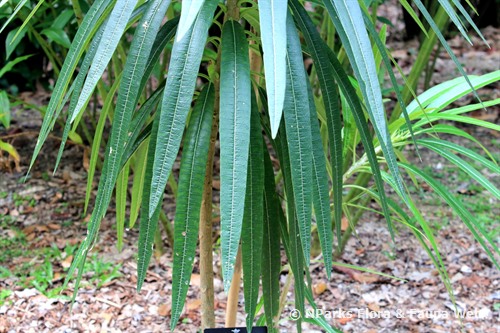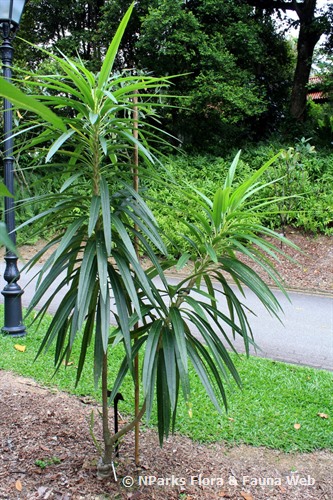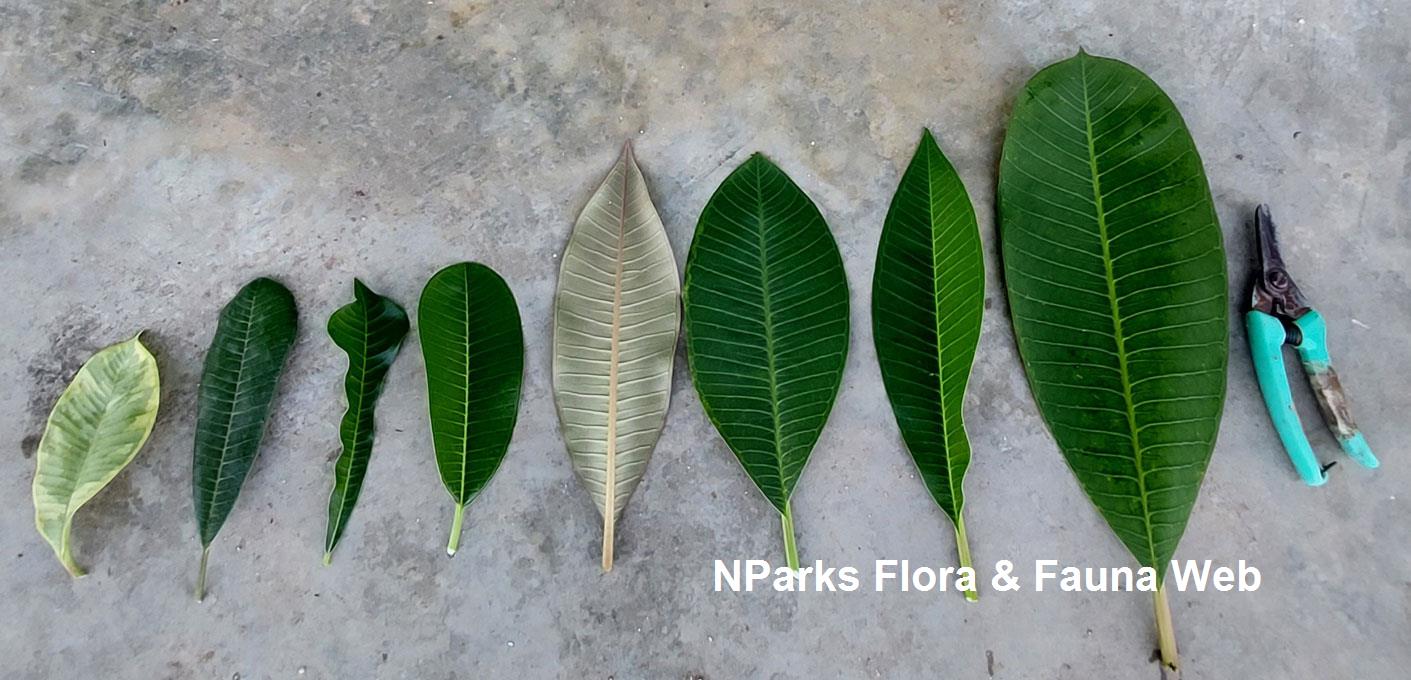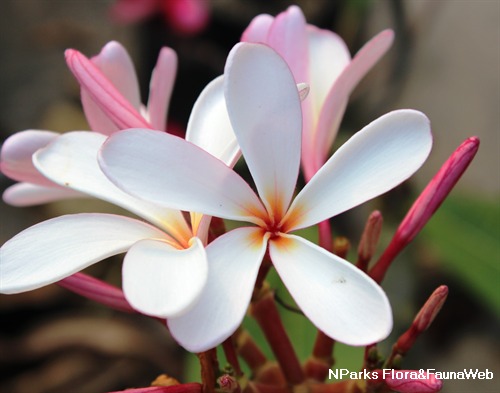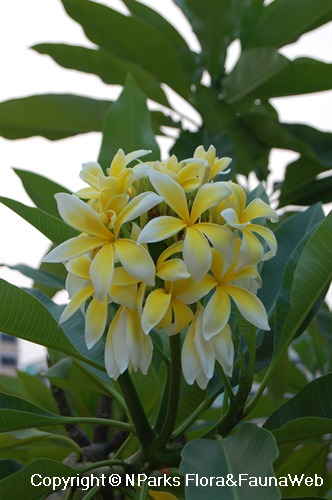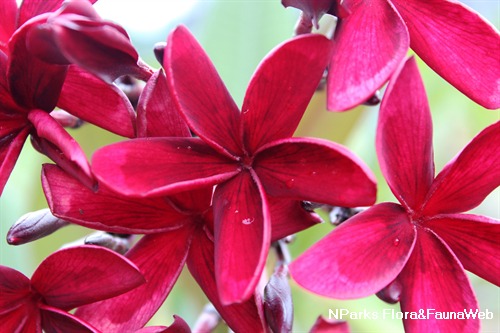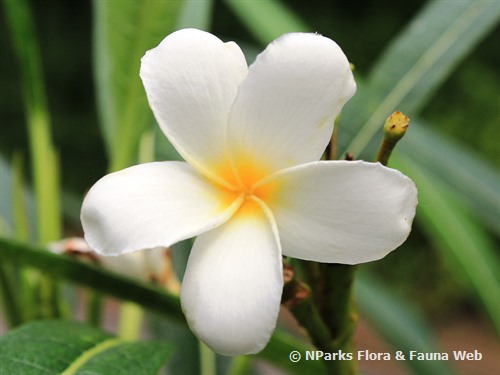
Back
Plumeria alba L.
| Family Name: | Apocynaceae |
| Common Name: | White Frangipani, 鸡蛋花 |
Plumeria alba is a tree which can reach up to 7.6 m tall. It produces abundant white flowers throughout the year. It is widely cultivated for its ornamental and scented flowers.
Name
Classifications and Characteristics
| Plant Division | Angiosperms (Flowering Seed Plants) (Dicotyledon) |
|---|---|
| Plant Growth Form | Tree |
| Lifespan (in Singapore) | Perennial |
| Mode of Nutrition | Autotrophic |
| Plant Shape | Irregular |
| Maximum Height | 7.6 m |
Biogeography
| Native Distribution | Puerto Rico to Windward Islands |
|---|---|
| Native Habitat | Terrestrial |
| Preferred Climate Zone | Tropical |
| Local Conservation Status | Non-native (Horticultural / Cultivated Only) |
Description and Ethnobotany
| Growth Form | It is a tree which can reach up to 7.6 m tall. All plant parts produce white sap when injured. |
|---|---|
| Foliage | The leaves are narrowly lanceolate, green and leathery. They tend to cluster at the end of the branches. |
| Flowers | Flowers are white with a small yellow center, and has a sweet floral scent. |
| Etymology | The genus is named after French botanist, Charles Plumier, who contributed significantly to the botanical exploration of the Caribbean and Central America in the late 17th century. The common name, frangipani, is from the name of an Italian nobleman who produced a perfume with similar fragrance to plumeria flowers. |
Landscaping Features
| Desirable Plant Features | Ornamental Flowers, Fragrant (Flowers) |
|---|---|
| Landscape Uses | Parks & Gardens, Small Gardens, Container Planting, General |
| Thematic Landscaping | Fragrant / Aromatherapy Garden |
| Usage Hazard - Cons | Irritant - Sap |
Fauna, Pollination and Dispersal
| Pollination Method(s) | Biotic (Fauna) |
|---|
Plant Care and Propagation
| Light Preference | Full Sun |
|---|---|
| Water Preference | Moderate Water |
| Plant Growth Rate | Moderate |
| Rootzone Tolerance | Well-Drained Soils |
| Diseases | Root rot can infect plants planted in poorly-drained soils. It is susceptible to mealy bug infestations and secondary infection of black sooty mold. It is also susceptible to rust fungus disease which infects the leaves. |
| Propagation Method | Stem Cutting, Grafting, Marcotting |
Foliar
| Foliage Retention | Evergreen |
|---|---|
| Mature Foliage Colour(s) | Green |
| Mature Foliage Texture(s) | Leathery |
| Foliar Type | Simple / Unifoliate |
| Foliar Attachment to Stem | Petiolate |
| Foliar Venation | Pinnate / Net |
| Foliar Margin | Entire |
Non - Foliar and Storage
| Trunk Type (Non Palm) | Woody |
|---|---|
| Root Type | Underground |
Floral (Angiosperm)
| Flower & Plant Sexuality | Bisexual Flowers |
| Flower Colour(s) | White |
|---|---|
| Flower Grouping | Cluster / Inflorescence |
| Flower Location | Terminal |
| Flower Symmetry | Radial |
| Flowering Period | Free-Flowering |
Image Repository
Others
| Master ID | 30270 |
|---|---|
| Species ID | 4579 |
| Flora Disclaimer | The information in this website has been compiled from reliable sources, such as reference works on medicinal plants. It is not a substitute for medical advice or treatment and NParks does not purport to provide any medical advice. Readers should always consult his/her physician before using or consuming a plant for medicinal purposes. |

